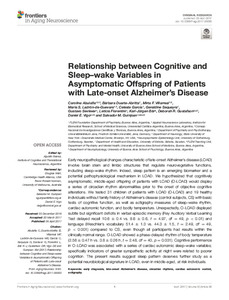Por favor, use este identificador para citar o enlazar este ítem:
https://repositorio.uca.edu.ar/handle/123456789/1463| Título: | Relationship between cognitive and sleep–wake variables in asymptomatic offspring of patients with late-onset alzheimer’s disease | Autor: | Abulafia, Carolina Andrea Duarte-Abritta, Bárbara Villareal, Mirta F. García, Celeste Sequeyra, Geraldine Sevlever, Gustavo Fiorentini, Leticia Bär, Karl-Jürgen Gustafson, Deborah R. Vigo, Daniel Eduardo Guinjoan, Salvador M. Ladrón de Guevara, María Soledad |
Palabras clave: | ENFERMEDAD DE ALZHEIMER; PROCESO COGNITIVO; SUEÑO; RITMO CIRCADIANO | Fecha de publicación: | 2017 | Editorial: | Frontiers Media | Cita: | Abulafia, C., et al. Relationship between cognitive and sleep–wake variables in asymptomatic offspring of patients with late-onset alzheimer’s disease [en línea]. Frontiers in Aging Neuroscience. 2017, 9. doi:10.3389/fnagi.2017.00093. Disponible en: https://repositorio.uca.edu.ar/handle/123456789/1463 | Resumen: | Abstract: Early neuropathological changes characteristic of late-onset Alzheimer’s disease (LOAD) involve brain stem and limbic structures that regulate neurovegetative functions, including sleep–wake rhythm. Indeed, sleep pattern is an emerging biomarker and a potential pathophysiological mechanism in LOAD. We hypothesized that cognitively asymptomatic, middle-aged offspring of patients with LOAD (O-LOAD) would display a series of circadian rhythm abnormalities prior to the onset of objective cognitive alterations. We tested 31 children of patients with LOAD (O-LOAD) and 19 healthy individuals without family history of Alzheimer’s disease (control subjects, CS) with basic tests of cognitive function, as well as actigraphy measures of sleep–wake rhythm, cardiac autonomic function, and bodily temperature. Unexpectedly, O-LOAD displayed subtle but significant deficits in verbal episodic memory (Rey Auditory Verbal Learning Test delayed recall 10.6 ± 0.4 vs. 8.6 ± 0.6, t D 4.97, df D 49, p < 0.01) and language (Weschler’s vocabulary 51.4 ± 1.3 vs. 44.3 ± 1.5, t D 2.49, df D 49, p < 0.001) compared to CS, even though all participants had results within the clinically normal range. O-LOAD showed a phase-delayed rhythm of body temperature (2.56 ± 0.47 h vs. 3.8 ± 0.26 h, t D 2.48, df D 40, p D 0.031). Cognitive performance in O-LOAD was associated with a series of cardiac autonomic sleep–wake variables; specifically indicators of greater sympathetic activity at night were related to poorer cognition. The present results suggest sleep pattern deserves further study as a potential neurobiological signature in LOAD, even in middle-aged, at risk individuals. | URI: | https://repositorio.uca.edu.ar/handle/123456789/1463 | ISSN: | 1663-4365 (online) | Disciplina: | MEDICINA | DOI: | 10.3389/fnagi.2017.00093 | Derechos: | Acceso Abierto | Fuente: | Frontiers in Aging Neuroscience, Vol. 9, 2017 |
| Aparece en las colecciones: | Artículos |
Ficheros en este ítem:
| Fichero | Descripción | Tamaño | Formato | |
|---|---|---|---|---|
| relationship-cognitive-sleep-wake.pdf | 235,35 kB | Adobe PDF |  Visualizar/Abrir |
Visualizaciones de página(s)
190
comprobado en 27-abr-2024
Descarga(s)
136
comprobado en 27-abr-2024
Google ScholarTM
Ver en Google Scholar
Altmetric
Altmetric
Este ítem está sujeto a una Licencia Creative Commons

